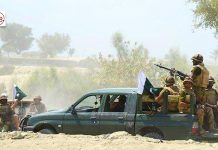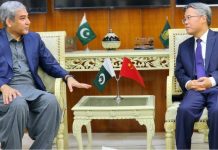Ganjal Baloch
On Saturday, June 24th, at around 5:45 PM, news of a suicide blast in Turbat, Kech, filled my Twitter feed. Initially, I felt a mix of numbness and disbelief, considering it to be a fidayee attack. My doubts were confirmed when the Baloch Liberation Army (BLA) claimed responsibility for the attack and shared a post about their second female fidayee, Sumaya Baloch, a courageous 25-year-old Baloch woman from Tutak Khuzdar. Her self-sacrificing act in Turbat, coming from Khuzdar, highlights the interconnectedness of our land and its people and reinforces the notion that the struggle unites us in preserving our land.
Summaya’s picture captivated me, reflecting her unwavering courage. Her face, soft and radiant, portrayed the essence of spring. She was adorned with the beauty of nature, her lips poised delicately, capturing the essence of the world within her eyes. I marveled at how such an innocent face could possess the strength and determination to challenge the might of the state of Pakistan. At that moment, I remembered Shari, the first female fidayee of Majeed Brigade, who carried out her attack despite being a mother of two children. Their love and sense of duty towards their motherland fueled their bravery.
In the early hours of June 25th, my mind was filled with a mix of emotions as I encountered various social media posts from known and unknown individuals. Some self-proclaimed Baloch feminists and state-sponsored women condemned the self-sacrificing act, and their hypocrisy infuriated me. These individuals often speak about equality, but what kind of equality do they advocate for? They seem blind to the fact that we are colonized and oppressed by the state. Baloch women face additional suppression under colonial rule, imposed upon us by the state itself, not by our men who are forcibly disappeared by the same state. These hypocritical feminists and state-sponsored women remain silent when women are mistreated and dragged on the streets by the police during protests for the safe release of their missing loved ones. They say nothing when Baloch women like Mahal are arrested or when these women mourn on the streets instead of celebrating Eid. However, they suddenly find their voice when a Baloch woman fights alongside men in the struggle for independence.
Another narrative that is being constructed suggests that Baloch women’s self-sacrificing acts cause us suffering. How can anyone under colonization make such foolish claims? Colonization itself is a chain of continuous suffering and oppression. In the 1970s, Baloch women did not engage in self-sacrificing acts for the land, but weren’t they sold in Lahore’s Heera Mandi? Shari Baloch, the first female fidayee, carried out her attack in 2022, but what about the hundreds of women who were disrespected, their homes raided, tortured, raped, and kidnapped before her? Zareena Marri was forcibly disappeared in 2009, and to this day, her whereabouts remain unknown. Was she disappeared because the state knew Shari Baloch would carry out a fidayee attack in 2022 or Summaya Qalandarani would carry out an attack in 2023?
For over 70 years, Baloch people have faced the consequences of the state, not because of these self-sacrificing acts but because of colonization. Thousands of Baloch women are widows, and thousands are half-widows who don’t know whether their husbands are dead or alive. Thousands of Baloch children have had their childhoods stolen by this state.
Do we know how these Baloch mothers of the land, these widows and half-widows, spend their lives in miserable conditions? They spend the rest of their lives without a son, a brother, a father, and a husband. Aren’t these Baloch women suffering because of this state? Even when they protest, they face baton charges and arrests. The consequences these people talk about are a terrible and nonsensical narrative. Are they not residing in Balochistan, unaware of its realities, or are they simply working on a single agenda, building a narrative against the war of independence?
Secondly, Baloch feminists should study the feminist approach. Feminism advocates for equality in work, society, and other aspects, so why do these Baloch feminists come up with the slogan “Don’t drag women into war”? Aren’t women part of this society? Aren’t they human beings? When you use this slogan, it means you are negating their basic human rights. This is only the second Baloch Woman fidayee attack; before that, numerous Baloch men did the same. Does this land only belong to Baloch men? Do only they have the right to protect it? Do only they have a national duty towards this land, and Baloch women do not belong to this land? Are they not human beings? Or perhaps these Baloch feminists are just hypocrites who understand the principles of feminism and are aware of women carrying out self-sacrificing acts, but they are against the notion of the war of independence. So, I want to tell them that it would be better for them to publicly and openly announce their opposition to the war because war, in any form, does not guarantee safety. These people should come forward and clarify their stance against war, or their approach to feminism will be disastrous. If they can’t be loyal to their motherland, they should at least be loyal to their feminist principles.
These individuals must realize that the state is a beast that will devour us all if we don’t resist. Merely being Baloch makes us a target of the state’s oppression, as evidenced by the murder of Hayat Baloch in front of his parents simply because he was Baloch.
Then there are those who claim that sending women for self-sacrificing acts devalues Baloch tradition. Firstly, these women are not sent; it is a conscious and intellectual choice they make to devote their lives to the cause because the land demands it. Secondly, Baloch tradition resides in our land, language, literature, people, and national wealth. When these elements are plundered and devalued, individuals like Summaya and Shari step forward to protect and uphold their dignity. When a house is raided in the middle of the night to forcibly disappear a man, and when women resist during that raid, only to be beaten, have their household items searched and stolen, and witness the men of the house being dragged away in front of them, it is indeed a clear devaluation of Baloch traditions. Thirdly, Baloch tradition is not about donning expensive Balochi Doochi dresses or sipping tea at conferences and fancy hotels while discussing how to exploit our land and people. Lastly, Baloch tradition should not be reduced to superficial displays of clothing but should embody the struggle for our land and people.
Now let’s address those who are somehow involved in this struggle but possess the courage to condemn such acts. To me, their stance appears lacking in courage and strength. They must understand that when we are at war, there is no room for half-heartedness. War is not a game where losing leaves you sad, and winning brings applause and praise. War is merciless, cruel, and devoid of beauty. It brings devastation, loss, and sadness. But when our sovereignty is at stake, war becomes a necessity, and at that moment, nothing is more beautiful than fighting for our freedom. We are willing to face a thousand deaths for the cause of freedom. In war, different strategies are employed, but that doesn’t guarantee our safety.
Even those in the mountains fighting guerrilla wars are not safe. Let alone them; even common Baloch individuals sitting under the shade of date trees in their homes are unsafe and can be killed, as Hayat was. So, how can we talk about freedom without accepting the possibility of sacrificing our lives? By acting as our enemies, our fellow Baloch only strengthens the state’s narrative, achieving nothing else.
Additionally, Baloch feminists should be delighted that now they have a space where Baloch women are participating in the war. These women are not being used or incited; their involvement is a national duty that every Baloch woman and man should embrace. War has no gender, and don’t you dare question the conscious decisions of these brave individuals who choose to serve their land.
Nothing holds greater priority than life itself, and then there are national heroes like Summaya who, despite losing their loved ones in the war, continue to stand strong amidst the storm, becoming a force to reckon with for the enemy. They endure and contribute until their last breath for the land, and this land shall never forget these remarkable heroes. The caravan of Ustad Aslam, sacrificing his son and eventually himself, along with his to-be daughter-in-law, are sacrifices that transcend human imagery. They are the embodiment of the foundation upon which Baloch land is built. They have proven that freedom is our ultimate destination, and it is the solemn duty of every Baloch man and woman to contribute to the war of independence.
Disclaimer: The views and opinions expressed in this article are those of the author and do not necessarily reflect the official policy or position of The Balochistan Post or any of its editors.






























